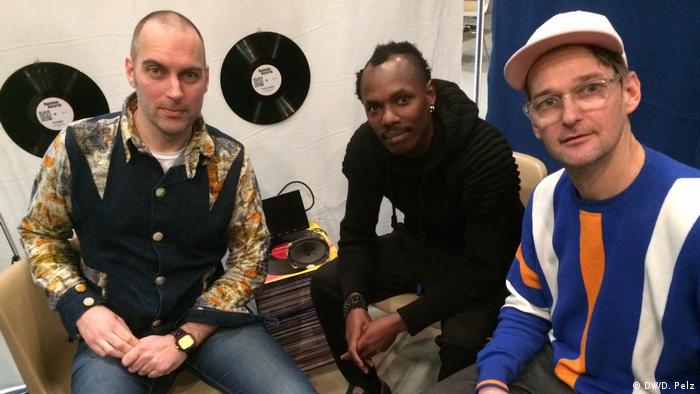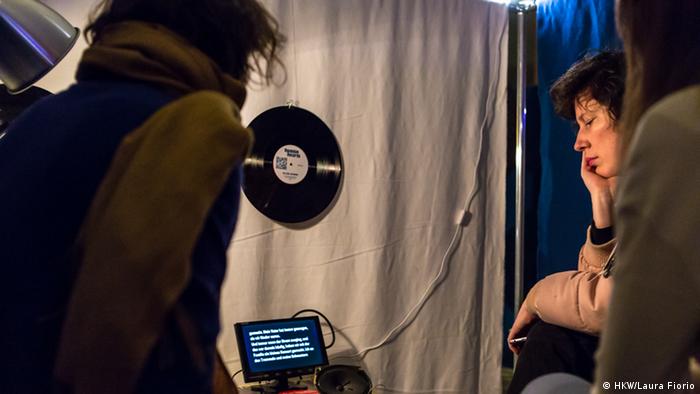Land of a thousand hills, the Silicon Valley of Africa, genocide: Rwanda, are linked to many tags. In the “problem Records” to tell Rwandans their own stories. Now the piece had its Premiere in Berlin.

Still, Rwanda is: crickets chirping, a motorcycle engine revs, from a corner of the strokes of a craftsman tones. The stories, sometimes sad, sometimes thoughtful, sometimes even funny. “Rwanda Records” has everything brought to Berlin. The walk through the “walk-in music for the theater” (self-representation) is an acoustic journey through the villages and roads of the East African country.
While the sounds of dribbling out of the speakers, the stories in small cabins using a Smartphone to retrieve. Each cabin in the “house of the cultures of the world” is a small microcosm. It is a story, sometimes a fate. Like the boy, grows up in exile. Classmates and teachers make clear to him that he is a “refugee” and is not one of them. He begins to look at all available maps to the Land of “refugee” – in the hope of a home where he is no longer the underdog.
Interviews with the people in the country
“No victim perspectives, but self-conscious people” should be listening to, says Jens Dietrich. For “Rwanda Records” he has collected with his colleague Milena Kipfmüller numerous stories in Rwanda. Five hours of audio material you have recorded, “Rwanda Records” is heard only by a fraction.

The creators of “Rwanda Records” in their Interviews in Rwanda
Also Dietrich came through the genocide, to deal with Rwanda. In 2011, he staged a piece about the radio station RTLM. During the genocide, the moderators of the channel had incited their listeners to kill as many people as possible. The piece of the theatre-makers also performed in the former Studio of the radio station in Rwanda. But he didn’t want to leave it at that.
“Most of the projects that deal with Rwanda, in dealing with the genocide. This is like a Label that sticks on the country. Of course has moved the country but much more. It is a country that is in transition, but also part of the globalized culture,” says Dietrich DW.
Search for identity
Eric1key is not only for this break, he brings him live on stage. Six Times per night, the Rwandan Hip-Hop artist breaks up the soundscape with Live performances. In a Golden jacket singing, jumping, and he’s sweating in front of the audience, a little show, a little is also a dedicated travel companion on the way into the story.
The is also a piece of his own. His father Congolese, the mother Ruanderin – the search for their own identity that runs through his life. “I’ve always wondered ‘Who am I? What am I?”, Eric1key says in a DW interview. To find answers, was not easy. He went to collect stories – only those of his own family, then the other people. And came across the history of his country.

The Team of Rwanda Records: Jens Dietrich, Eric1key, Klaus Janek (v. l. n. r.)
“The genocide was an Explosion of something that had far started earlier,” says Eric1key. “We can only understand what happened, when we speak with people and ask: ‘what do You call Yourself? Do You still think that Hutu and Tutsi do not exist? What is for You a Hutu and a Tutsi? The answer to these questions is often different.”
Hip-hop and traditional music
Stories, sounds, feelings – composer Klaus Janek wants to unite all of that in his music. With the double bass he is on stage, almost kind of like a resting Rock in the Surf next to Eric1key. “Rwanda Records” combines many styles of music – traditional Rwandan music, hip-hop and other modern styles. Also, musically, to be felt, Rwanda is not an island but has long been part of the Modern.
“Music is perceived in the Tradition of Rwanda is very strong so that it gives a voice and an Instrument,” says Janek in the DW-interview. “Even if someone is playing an instrument, then the Instrument accompanying the singing, even if it could actually be used as a standalone Element.”
The location for the premiere is deliberately chosen: Berlin, scene of the infamous Berlin conference of 1884/85, at which the European colonial powers divided the continent among themselves. Berlin, the capital of the former German Reich, Rwanda, 1890 colonized. Rwanda’s story is also a piece of German history, the descendants of the colonizers and the Colonized are now sitting on chairs, Sofas, and a bed, and to listen to.

Using a Smartphone, the listener can listen to the stories
“I lived for several years in Rwanda and find much that is Familiar. But at the same time, it is also a different angle. I think it’s very interesting,” says a visitor to the DW after one of the cabins left.
“It is an exciting insight into a culture and a history that we hear of here in Germany rarely. Rwanda is a blind spot on the map,” says another, which is already at the output.
“You see, such as Rwanda discovered, his own story, spoken by the country’s own citizens: the youth, the new Generation. It is a reflection on our past and about the present”, also praises Rwanda’s Ambassador to Germany, Igor César, who came to the premiere.
The creators hope to show the “problem Records” soon in Rwanda. “In our schools and museums, it is mostly about our collective history. It is the stories of individual people, but it is rare to find, which can tell us how it used to be,” says Eric1key. At least on the Internet the stories are to be heard soon in the world.